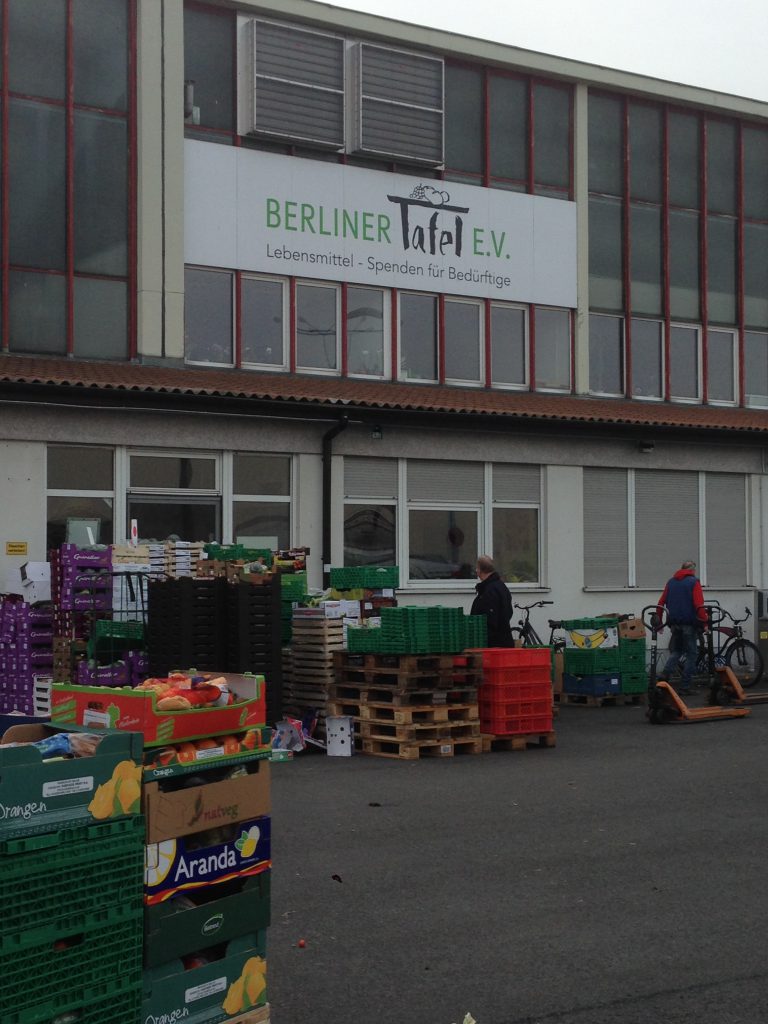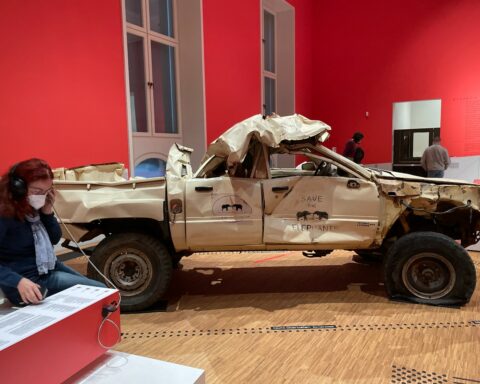Holger has a friendly phone voice. The right kind of voice for someone who has to encourage people to volunteer. Which is what I was doing, in my stumbling German, which is made worse by using the telephone.
(Was is it about the phone that makes speaking a foreign language even more painful than face-to-face? Is it the imagining of the grimace, the rolled eyes, or the pretense of gagging?)
He switched to English for a bit, to relax me. Or to speed things up. Whatever. It worked.
So, yes, 11 a.m. on Saturday.
I’ll be there.
First, on my very doorstep
I was just a few steps out of the front door when a woman crossed into my path. Do you have money for a coffee? she asked me in German. Or a euro? I delivered my no to both with a smile and a shake of the head and walked on.
The contradiction settled in rather quickly of course, albeit belatedly: I was about to cross town — a full hour door to door — to volunteer at a food pantry. Apparently, I was ready to work to feed those in need but not on my own doorstep??
Sigh.
Getting to Berliner Tafel

Ralf was the one to introduce me to Berliner Tafel. He had taken a group there as part of a seminar he had organized for Arbeit and Leben (Work and Life) during Grüne Woche (Green Week), the annual agriculture and food fair here in Berlin. The organization’s mission is simple: to collect grocery donations from all over Berlin and redistribute it to those in need through the organizations that serve them. Among many other tasks, volunteers are needed to sort through the considerable amount of donated foodstuffs, much of which is just past the sell-by-date or not otherwise sellable at fresh food markets.
Getting to Berliner Tafel requires a map. I thought it would just be about plugging the location into Google Maps but, nope, Holger sent me a map with arrows to navigate me to Berliner Tafel’s location on the grounds of Berliner Großmarkt, a logistics center for some 300+ food wholesalers.
I had to wind my way past warehouse after warehouse and past truck after truck, most of which were shutdown. I was on the grounds shortly before 11 a.m., probably long after most of the trucks had been packed up and routed to the day’s destinations. Strange nevertheless that I didn’t see another person on foot the entire way there. I was expecting a huge hall with a buzzing hive of volunteers, I expected to be carried along to a huge hall in the midst of a buzzing hive of volunteers right to Berliner Tafel’s front door.
The failure of convenience
Instead, I was just one of five new people for Holger’s introduction speech. The rest, probably another 20 or so, were regular volunteers and a handful of staff. As both Holger and the website boasts, Berliner Tafel was the first of its kind in the entire country when it was founded in 1993. What should I take from the knowledge that there are now more than 1200 of the — that Germany’s need for such services has increased or that jurisdictions had become much smarter over the years about how to reduce food waste?
The latter is critical to this in any case. There is a LOT of food waste. I probably wasn’t the only newbie in apron and gloves to be shocked by the huge amount of wasted potential represented by that the mass of boxes, crates, and trash bins. I would go so far as to say that programs like Berliner Tafel are a necessary part of any redemption of the typically wasteful Western food ecosystem. Wrapping red, green, and yellow bell peppers three to a bag is a shopper’s convenience but is also why all three must be thrown out when the ripe yellow pepper begins to break down. One spoils so they all have to go, according to this convenient “logic.”
We volunteers cut through plastic to sort out what was salvageable, stacking bin after bin of perfect potatoes, carrots, peppers, oranges, apples, bananas, salads, and more that we saved from the trash merely by freeing from its packaging with spoiled kin. A couple of volunteers worked just on brussel sprouts. It’s one of my favorite vegetables so I know that, like other cabbages, merely peeling back brown outer leaves reveals its fresh green inner leaves. Apparently, the grocers simply toss the bags when the outer leaves brown because most buyers think they have rotted.
We are killing our planet for the sake of convenience.
Waste not, want not
Last year, I read great reports about the EU’s efforts to reduce food waste. A lot of it came on the heels of this effort by French supermarket chain Intermarché.
The video describes the brand’s decision to set up aisles in its stores for the sales of “Inglorious Fruits and Vegetables.” These are the ones that usually don’t make it to the store shelves because people equate natural form variations — an unusually shaped eggplant, for example — with being inconsumable. Intermarché buys these at a lower price from the wholesalers and offers shoppers the choice to buy them at 30 percent less than they would pay for the typically shaped version of the same.
According to FAO, the Food and Agriculture Organization of the United Nations, approximately one-third of the food we produce world is wasted while more than 870 million people go hungry.
My Berliner Tafel experience — my lesson from week one of my #2015if 52-week challenge — shows that I can do something positive in my own life to challenge this madness. I do not need to stand knee-deep in a food recycling effort if I am doing my share to see that food does not get wasted at all.
P.S. With even 3€ per month, donors make Berliner Tafel’s food pick up and redistribution system possible. If you cannot donate your time, make a financial donation!






